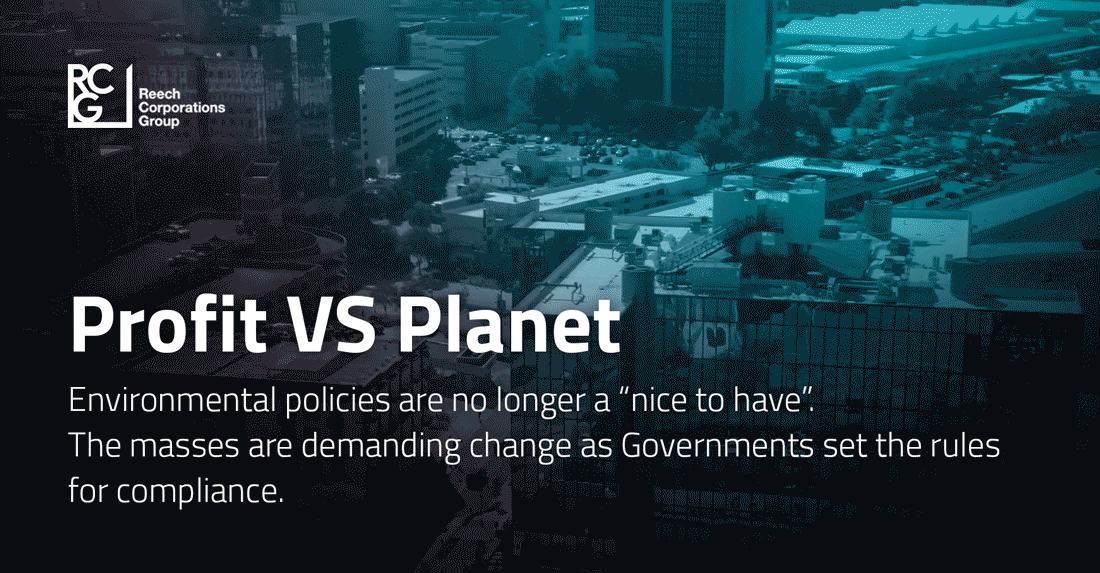Profit VS Planet

Environmental policies are no longer a “nice to have”. The masses are demanding change as Governments set the rules for compliance.
As the beam of the environmental spotlight has broadened, global stakeholders are shuffling in their seats as they try to make sense of what is potentially the most disruptive force in industry since the industrial revolution. Climate change may well be the zeitgeist of the 21st century and corporates would be foolish to dismiss it as a fad that will lose impetus.
We are living in a time of epic disruption, almost every industry has been knocked off their cushions of complacently. There has been a massive shift of power; where individuals, through social media, are able to band together to achieve feats unheard of 30 years ago. Social media has ousted presidents, made pimply faced teenagers rich, and put political neophytes in the driving seat of governments.
Technological progress has been exponential rather than linear and this has fuelled the disruption. When there is exponential growth, there are no rear-view mirrors, it is impossible to predict what is coming down the pike – we no longer have the reference points of the past. While technology has catapulted industrial and commercial development, its impact on the environment and humanity has been overlooked, under-estimated or ignored. And its these glaring oversights that are getting both activists and regulators hot under the collar.
Lending significant weight to the climate change narrative is the Extinction Rebellion (XR) who have been using non-violent civil disobedience to force government to address climate “tipping points” such as biodiversity loss and ecological collapse. Governments have not ignored environmental issues, there is plenty of legislation that holds industry accountable. However, the focus has now shifted to the perpetrators of environmental maleficence -industry.
CEO’s of all industries are struggling to keep up – as the ink dries on one piece of legislation, new challenges emerge, creating an ever-morphing compliance regime. Board members now have the task of ensuring that the green agenda is being properly addressed, and not just “tick boxed”. While no one can argue that climate change is not a legitimate concern, one must weigh up the cost of large-scale changes to industry. While industry has a duty to preserve the environment, they need to appease another formidable entity – their shareholders.
Now more than ever, boards must be cognizant of the impact their enterprises have on the environment, not just because it’s the right thing to do, but because they must perform a delicate balancing act of profit vs planet. They will soon be faced with heavy regulation that may not have been accounted for. Some companies have however started to set standards and align corporate performance goals, even if it means less profit for shareholders.
Penalties for contravention of environmental laws are significant. Courts want to send a strong message; they have compared the fines applied to financial services contraventions, stating that, where harm results from deliberate action or inaction, fines could equal 100% of the company’s pre-tax net profit for the relevant year.
Financial regulation is a good yardstick for what’s down the road in terms of environmental regulation. Boards should be engaged in the formation of regulatory processes, i.e. commenting on government proposals and white papers, having a presence on discussion panels, forming associations to set industry standards and prioritising methodologies for simplifying the reporting processes.
Given the vast amount of regulatory issues boards must now deal with, communication between the members must be concise, relevant and accurate. The use of innovative technologies for board packs and reporting will be key in making sure that the issues are appropriately covered off and actioned in the board meetings.
If we are to learn anything from the extinction rebellion, and indeed any issue that rallies the masses, it’s to not ignore it. Recent examples of the weight these rebellions are numerous; the Hong Kong protests (anti-extradition bill), the Myanmar and BLM protests, the Belarus and Russian uprisings and the ousting of Zimbabwe’s Robert Mugabe.
The extinction rebellion may be about bugs and bees, but big business will be stung if they are complacent, not only by regulators but by their own customers. Enterprises are not immune to mass negative sentiment and many have suffered huge drops in valuation when the weight of negative opinion is tipped against them.
Notwithstanding the environmental kudo’s, consumers generally have higher regard for companies who put green on the top of their agenda. When a rebellion is about the environment, the adage “If you can’t beat them, join them” means everybody wins.